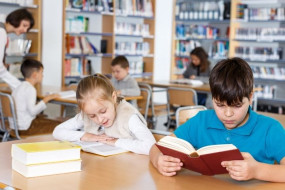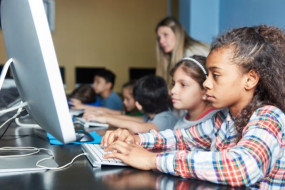- Your School Type
- Solutions
- Resources
- Blog
- Events
- More
- Contact Us
- Book a Demo
- Get a Quote

We are excited to share this guest blog written by Dawn Woods, Member Development Librarian, School Library Association (SLA). In this blog Dawn discusses the purpose of a school library how a school library can support education.
The purpose of your school library is to help every member of your school community — students, staff, families and whanau* — gain new knowledge, skills, and dispositions for learning and personal development that they will use throughout their lives.
https://natlib.govt.nz/schools/school-libraries/understanding-school-libraries/purpose-of-the-school-library
*an extended family or community of related families who live together in the same area.
Schools exist to educate children and young people. Libraries aid this aim in their provision of resources to directly address the curriculum and to read around it. Within the library, staff are teaching information and critical literacy skills with the aim to help develop independent learners who are curious. In a curated collection tailored not only to the curriculum in any particular school, but also to the age and abilities of the student community and the school staff, the library offers a greater number and range of material than users would otherwise have access to.
These resources can be in any medium (physical books, e-books, audio books, magazines, journals, music, articles, news, resources – to name a few!), and library staff will make it as easy as possible to make users aware of their existence. Whether that is by teaching retrieval skills in subject-related lessons or by giving one-to-one instruction in response to an enquiry. They may display the material on the shelves, on screens, via bookmarks or in subject guides, printed and digital.
An online library management system accessible from anywhere 24/7 enables library staff to make this carefully curated stock available, organised in ways that users can find what they need.
Below we’ll explore in more depth the different areas where a school library can support education.
The school library has a purpose of promoting reading for pleasure via a collection of books and e-books designed not only to increase literacy levels but also enjoyment. New titles will excite, and by exploring students’ interests library staff will be able to suggest appropriate reads from their own stock knowledge, gained through their own reading and vital networks. Library staff are consequently able to provide support for teachers, making them aware of titles to engage students and widen their repertoire, opening their minds to new authors and genres.
The research showing the many beneficial impacts of reading for pleasure is extensive. You can explore some of it here: https://www.sla.org.uk/impact
This increases the range, breadth and depth of resources the student community are experiencing. Knowledgeable staff can point their users to titles to individually tailor the reading journey, sometimes going round a roundabout a few times if familiarity is needed at that time, sometimes taking a detour to explore a different interesting topic or genre, but always moving forward.
“A healthy, well-used library is a strong indicator of the reading culture of a school.”
(Alex Quigley, Closing the Vocabulary Gap, p146)

Students may work through textbooks designed to pass exams in different subjects. School libraries provide the material for reading around that subject, to widen and deepen knowledge, embedding the learning. Information books have improved considerably over time and can also be enjoyed as leisure reading. They invite the reader in, and library staff keep up to date, purchasing and displaying these to great effect.
This provision is designed to improve student attainment levels, as evidenced here:
“School libraries have been found to impact pupils’ general academic attainment, reading and writing skills, plus wider learning skills, as well as their scores in history, mathematics and science.”
(School Libraries: A literature review of current provision and evidence of impact. Anne Teravainen and Christina Clark, June 2017)
“When in doubt, go to the library” as Ron Weasley says of Hermione as she rushes off to do some research. Schools need to provide libraries to encourage this curiosity and independence in pupils for finding answers. We cannot teach young people everything they need to know – we need to teach them how to find it, when they need to know. Libraries provide this range of resources to enable students to think critically, consider what they need, search for it and evaluate the information they discover. Promoting that independence whilst at school, yet with the protection and support available to them from library staff and teachers, helps establish working patterns for life.

A surprising number of students do start school not knowing how libraries work. Not every library will use the same Library Management System, the same classification, have the same borrowing rules, but knowing the theory of how these work eases a young person into transferring the knowledge they possess in a new setting.
Given the important role libraries play in health settings, law offices, corporate and government settings – not to mention public libraries and university libraries – having an appreciation for the foundations of how a library works puts young people a step ahead.
“Just 9% of 15 year olds were able to tell the difference between fact and opinion.”
(PISA 2018 https://consiliumeducation.com/itm/2021/04/28/globally-competent/ )
A programme of information literacy skills targeted at appropriate ages and ability levels, taught in the school library where the resources are held to put these skills into action, is aimed at producing citizens able to participate in meaningful ways in society. We know what questions to ask and seek to discover answers for leading a fulfilling life.
“The goal of all school libraries is to develop information literate students who are responsible and ethical participants in society. Information literate students are competent self-directed learners who are aware of their information needs and actively engage in the world of ideas. They display confidence in their ability to solve problems and know how to locate relevant and reliable information.”
(IFLA School Library Guidelines, IFLA, p7)

Reading increases empathy levels. Scientific evidence shows that immersion in literature is an effective way to build our understanding of other people and be more understanding ourselves.
https://www.bbc.com/future/article/20190523-does-reading-fiction-make-us-better-people
“Studies have shown that children and young people who use the school library have, on average, higher mental wellbeing scores. Those who don’t use the school library are nearly twice as likely to have low mental wellbeing than they are to have high mental wellbeing.”
(School libraries: Why children and young people use them or not, their literacy engagement and mental wellbeing Findings from our annual literacy survey 2017/2018. Christina Clark and Anne Teravainen-Goff December 2018)
An organised programme of speakers can offer pupils, who may otherwise not come into contact with motivational speakers or published authors, that cultural capital they may not receive elsewhere. Young people are inspired by others, giving them aspirations and hopes to achieve their dreams, opening their eyes and exposing them to a wider world.
OECD are now measuring social and emotional skills and the school library can contribute effectively to helping young people develop in this area.
(https://oecdedutoday.com/new-approach-social-emotional-skills/ )
School libraries also have another purpose – it offers the infrastructure of space and hardware.
The space extends to a social and cultural place to meet, or a sanctuary free from judgement with students allowed to select their own reading choices, whether that is a comforting quick read or a title to challenge thinking.
A school library is not a formal classroom, neither is it a playground which can be a confusing place to be for the less confident, but a space to feed interests or simply relax from the fast-moving world around.
It will also provide hardware and software, perhaps unavailable at home, which students can use for homework or (within reason) for leisure interests.
The purpose of a school library may be to support the learning of our children, but it is the holistic education of all round development, not simply academic needs, and every school needs this support for their pupils.
There are a wide range of reasons to have a school library, and when it’s supported the difference it can make is really significant. It can be harder to capture because it doesn’t sit within a single subject, year group, or area of responsibility, but it can be felt across the community, in the very fabric of the school.
You can download the School Library Association’s infographic here: https://www.sla.org.uk/impact
Dawn Woods
Member Development Librarian, SLA
The SLA is a UK focused charity which supports everyone involved in school libraries. We believe that every pupil is entitled to effective school library provision and the educational, emotional and developmental benefits that come with it. The SLA is committed to supporting, promoting and sustaining high quality reading, teaching and learning opportunities for all in a diverse and changing world.
To learn more about joining our community, visit our website, follow us on Twitter or get in touch with info@sla.org.uk.